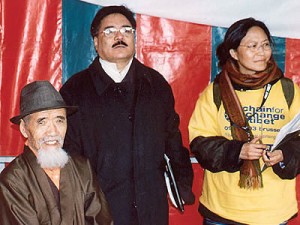
From left: Takna Jigme Sangpo, Tibet’s longest-serving political prisoner, Migyur Dorjee, Secretary of the Office of Tibet in Brussels, and Tsering Jampa, Executive Director of ICT Europe.
In commemorating the 44th anniversary of the Tibetan people’s uprising against China’s occupation, the participants called upon the EU to act decisively in support for Tibet.
Tibetan hero 76-year-old Takna Jigme Sangpo addressed the crowd of Tibet supporters for one of the first times since his release from prison last year.
European, Chinese and Uygur speakers joined him, expressing their solidarity with the Tibetan cause and calling on the EU to push for change in Chinese-controlled Tibet.
“The new Chinese leadership must not hide from the need for change,” said Tsering Jampa, Executive Director of ICT Europe. “It must look at the problems of the Tibetan issue, and of China itself, with new eyes”.
Chinese democracy activist Mo Li Hua also echoed the need for change in China and Tibet, commenting that China should not view His Holiness the Dalai Lama as its enemy nor a threat to China’s unity.
“Hu Jintao and his new government have both a great challenge and opportunity in front of them,” Mo Li said.
“They are in a position to reassess China’s policy on Tibet. They must establish formal dialogue with the Tibetan Government-in-Exile to peacefully resolve this long-standing issue between our two peoples”.
Senator Edvard Outrata of the Czech Republic, a country which stands poised to join the EU in 2004, noted how his country also suffered under communist control and reminded the audience that political change is indeed achievable. He called on the people and governments of Europe to continue their support for Tibet to help bring about this change.
A French member of parliament, Joel Gerard, highlighted the strong support that the French people and parliament have for Tibet. However, he argued that the French and European governments should take a stronger stance against China in support of Tibet.
Hundreds of people from Chinese-controlled East Turkestan also gathered at the Esplanade du Cinquantenaire and participated in the human chain. Uygur leader, Erkin Alptekin, talked about the importance of non-violence in both the Tibetan and Uygur peoples’ struggle for self-determination. He said that the Tibetan and Uygur people must stand united both in exile and in their homelands.
Chain for Change in Tibet was organised by the Benelux coalition of Tibet support groups: Tibetan Community of Belgium, Les Amis du Tibet and Vrienden Van Tibet, Belgium, Tibet Support Groep Nederland, Les Amis du Tibet, Luxembourg, and the International Campaign for Tibet – Europe.

